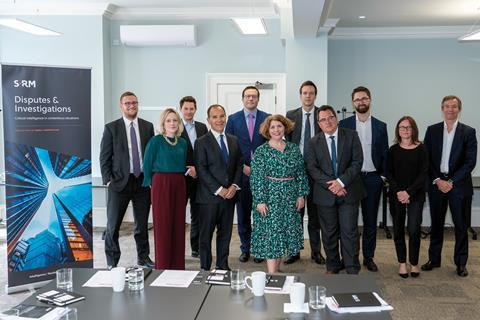Most of the global risks businesses face are not new, but their confluence should shape corporate conduct and the legal advice that supports it
On 16 February 2022, Cambridge University students were treated to the foreign policy insights of Sir Simon McDonald, former head of the UK’s Diplomatic Service. One issue was front of mind: was Russia about to launch an all-out invasion of Ukraine? McDonald said: ‘I think Mr Putin is achieving enough of his objectives with his choices to not feel the need to invade the east of Ukraine further than he has.’
Russia’s subsequent invasion of Ukraine a week later created just one of the crises that have increased dangers for clients far beyond their original appetites for global business risk. In recent years, that list has included a ‘hard’ Brexit; the Covid-19 pandemic, and its attendant lockdowns and restrictions; the growing impact of the climate crisis; the rise of authoritarianism; and a hardening of China’s resolve to use force to bring Taiwan under the authority of Beijing.
Clients facing disputes in this context must make judgements about what recourses they have to justice and the possibility of enforcement. It is that broad picture of threat that lawyers, and the political risk consultancy S-RM, address at this Gazette roundtable.

Horizon
The discussion begins with an open question about what risks should be on the radar for clients. Philippa Charles, an experienced litigation and arbitration solicitor now at Twenty Essex, identifies two key areas of concern. ‘One is impact from [artificial intelligence],’ she says. ‘Once you start looking at the applications in generative AI, it very quickly becomes clear that there’s an enormous risk management exercise that needs to be undertaken if people are really going to engage with it productively, and that there are enormous risks.’
A second major risk, which Charles assesses to be ‘underrated’, is water: ‘I think water and the access to it, the availability of it and the price of it, is going to become increasingly contentious in years to come.’
On the effect of sanctions related to Russia’s invasion of Ukraine, Dechert partner John Bedford notes that after the initial panic (which he summarises as ‘Are we sanctioned, or are we dealing with sanctioned entities?’), risk assessments and disputes are still developing. Not least as ‘the sanctions have evolved’, he points out. His firm has taken on a bond trading dispute in the High Court, he says. Financial institutions are watching Celestial Aviation v UniCredit closely, as the outcome will determine the impact of sanctions on payment commitments.
While few force majeure cases have come to fruition since such sanctions began and were expanded, Jenner & Block partner Charlie Lightfoot has been instructed on one. This arbitration case turns on ‘the question of whether [sanctions] constituted a force majeure event, and if they did, whether notice was duly given and what the consequences of that were’.
Lightfoot describes the dispute as ‘classic contractual stuff’, but adds: ‘It does involve an analysis of the underlying sanctions, which I think, to the point in terms of risks and managing risks and … drafting these clauses, is quite interesting.
‘What’s become apparent with the benefit of hindsight is how difficult it was for a company in a particular position in March 2022 to understand the landscape that it had to navigate and give notice within a particular period of time as to whether it felt it was or might be prevented from performing.’
‘Sanctions will appear in so many different ways, so many different business transactions, simply because of the scale [of them],’ observes Tom Bowen, partner at Simmons & Simmons.
‘We find there’s quite a significant intelligence requirement from clients to analyse the ownership and control of potentially sanctioned entities,’ S-RM’s Marcus Fishburn relates. ‘For example, we work for the insurance markets, trying to help them meet their responsibilities while avoiding the risk of exposure to sanctions.’
Sanctions, says Fishburn, can combine with other issues in some jurisdictions: ‘Political violence claims tend to arise out of civil unrest, such as [in] Myanmar… where there are also sanctions regimes… It’s a genuine concern for insurers that they don’t pay out a claim that’s going to put them in breach of sanctions legislation.’
The stringency and scale of sanctions mean they have worked in concert with another risk on the radars of clients and their legal advisers: reputation. Clients and lawyers have seen how a real, or imagined, connection to sanctioned entities has played out, and the speed at which companies and law firms had to extricate themselves from Russia and to shed Russian clients, whether or not they had links to the Kremlin.
‘Sanctions have obviously been around for much longer than February of last year,’ S-RM’s Septimus Knox notes. ‘The difference is that whereas [in the past] businesses were very much willing to go into Russia, work and transact there, the challenge now is that there has been a total separation. Any contact with Russia, be it sanctions-related or not, is reputational kryptonite, and most businesses just take the decision not to engage in Russia at all.’
As a result, a key question for many clients, Bedford says, is planning for a possible attack on Taiwan: ‘What are we going to do with the potential sanctions on China? We’ve got the exposure there.’
Enforcement
Bowen notes that enforcement action on sanctions by regulators and enforcement bodies have long time lags.
‘If you were monitoring enforcement activity, and, particularly in the US, but also in Europe and the UK, you might think there’d been a bit of an uptick already. But actually, all of that enforcement relates to stuff that happened more than 18 months ago,’ says Bowen. ‘Most of it is [on events] three, four, five years ago.’
The ‘sheer volume of money, the sheer volume of transactions that are moving through the financial system which have a sanction[s] impact’ spells trouble for clients where their compliance systems missed a breach, he adds.
‘Everything I’ve done in the last five or six years has some kind of political element to it,’ says Stewarts partner Elaina Bailes, due to ‘[political] instability which then leads to shifting power: parties falling out, wanting to contract [with] different people, wanting to move their money to different places’.
‘People like to talk a lot about ESG and ESG disputes, and it’s a real hot topic,’ Bailes continues. But complying with legal commitments and regulation in this area is not her clients’ only concern. Where ‘the zeitgeist [has] moved on’, she says, ‘we’re seeing clients coming to us and not just wanting to look at what can I do under this contract… It’s a much wider picture that they’re looking at, and it goes beyond just commercial considerations’.
Gibson Dunn partner Philip Rocher says colleagues in his firm’s ESG group relate many possible cases in ‘the initial stages’. Early signs of a future dispute include advice to compliance departments and a focus on supply chains. He refers to Client Earth’s case against Shell’s directors as individuals, as a category of case whose prospects he was ‘a little bit sceptical’ of at the outset, but which he thinks will ‘keep coming’. ‘It hits all the right buttons of the environmental crisis and… [alleged abuses] of human rights,’ he notes.
‘The courts,’ Rocher adds, ‘are very reluctant to be too aggressive in dismissing a claim that, [for example], miners in an African country were abused or their rights were trodden on by a subsidiary of a UK plc.’
‘Something we see a lot now in disputes is parties using the ESG angle as a vector for either effecting settlement or even colouring the public opinion of their adversary,’ Knox says. ‘Be that in the courtroom or in the press. That’s only going to be on the rise because, for some businesses, ESG has not been high on their risk register and it’s only recently become a concern. It’s quite a ripe, fertile ground for investigation.’
Lightfoot raises the prospect of ‘claims against the Russian Federation’. ‘The big question,’ he says, ‘is not whether there are viable public international law claims. There plainly are. The question is whether a large award against the Russian Federation is going to be of any use to you in the foreseeable future. And I think a lot of people are wrestling with that… there’s hundreds of billions of central bank foreign reserves frozen in G7 [member states], and it feels to me as though there is a sort of political shift towards finding ways to deploy that money in reparations in one way or the other.’
There is, Knox notes, a US precedent here, in which ‘Afghan funds were used to pay victims of 9/11’. But, he cautions that the ‘Russian government, over the past decade or so, has taken huge steps to, what they call, “de-offshorise” and return everything onshore, and make sure that they’re very resilient to any claim that’s brought against them from an enforcement perspective.’
Charles adds that, ‘there’s a whole bunch of property owners in Crimea who’ve successfully sued the Russian Federation’ through investor-state dispute mechanisms. ‘They’ve won,’ she says, ‘but they’re nowhere near recovering anything, and I don’t think they will recover anything for a very, very long time.’
That’s not a timescale, Rocher notes, that litigation funders are willing to accept, despite the legal strength of such claims, and the growth in funds.
‘It’s a superb case,’ he notes. ‘But the funders’ focus is completely on recoverability of assets, which is not anything to do with lawyers, it’s [a question of] where are the assets, who you’ve got to try and enforce it against and how long will it take?’

Cyber risks and threats
Cyber-attacks, to which all sizes of organisation have proved vulnerable, are on the increase. This is a risk with links to conflict and geopolitical tensions.
Simmons & Simmons partner Tom Bowen says: ‘I understand that it is now increasingly difficult and incredibly expensive to obtain cybersecurity cover for large organisations.’ He adds that the cost is so high, some companies are instead putting that money into reinforcing their IT systems and building up ransom funds for making payouts in the event of successful attacks.
‘Only a fifth of companies in the UK have cyber insurance,’ S-RM’s Septimus Knox (left) replies, ‘whereas in the US, the number is greater.’ He notes that there has been a hardening of the cyber insurance market for several years. ‘Insurers are far less willing to make these payments than they were before, which means that we do a lot on the cyber-side of our business to help companies secure better cybersecurity premiums. We do that by making sure that there’s a lot of work done at the front end to ensure that everyone’s trained, the systems are up to date, and they’re resilient.’ Cyber-attacks, ‘particularly those that are state-sponsored, are only increasing and, accordingly, so has the degree of sophistication’, he adds.
Cybersecurity insurance commonly covers the cost of services needed to respond to a successful attack, and not consequential loss.
Knock-on effects
The effect of crises, such as the Ukraine war, on the economy, not least high energy prices, means commercial clients are bringing other problems to their lawyers for solutions.
‘Quite a lot of those risks feed directly into economic pressures on businesses,’ Farrer & Co solicitor Ben Longworth says. ‘Clients are coming to us and saying, “This contract is no longer economic, what can we do?”.
‘There’s a lot of pre-litigation advice about how we can get out of a contract, or how we can amend a contract or how we can renegotiate in order to try and mitigate those risks… but in many cases it’s not possible to find a solution where it works for everyone and litigation is going to result.’
Charles notes that clients have behaved differently according to the context of their dispute. She observed a lot of ‘goodwill to renegotiate or find a way through’ a dispute where the root cause lay in the conditions of the pandemic. Whereas, goodwill ‘to renegotiate or find a way through’ is more likely to be absent if a dispute arises from sanctions on or the actions of the Russian state.
The Brexit terms negotiated by the UK government led to concerns about the position of UK courts and the enforceability of judgments, especially when the UK was refused accession to the Lugano Convention. What has been the impact on cross-border disputes?
‘I don’t know if it’s really played out to the extent it’s going to play out yet,’ Cooke Young & Keidan partner Sinead O’Callaghan says. Enforcement concerns may be pushing more clients to select arbitration in the dispute resolution sections of agreements, she says. But she does note a ‘significant decrease’ in Commercial Court cases in the past year: ‘It does seem to be worrying that the courts are less busy than perhaps they used to be.’
Bowen notes that after the Brexit referendum, ‘we gave a huge amount of advice to several different financial institutions’ that concerned jurisdiction and enforcement. Most, he says, then decided they were ‘comfortable’ with England and Wales as a jurisdiction for court disputes. In prospect is the Hague 2019 Convention that will make mutual recognition of judgments between the UK and EU jurisdictions easier when the UK accedes to it (although it is narrower in scope than the Lugano Convention).
Lightfoot adds a footnote here: ‘My sense is that arbitration is pretty popular, but it’s not stealing English High Court litigation.’
Plan for uncertainty
Clients, of course, are not dealing with global challenges in isolation. As Bowen points out: ‘One of the more interesting ways that ESG links up with financial crime and sanctions is when it comes together with enforcement.’
The UK and EU lag the US in this regard, but he sees significance in the US approach. An example is import prosecutions against American companies for alleged use of forced labour in China’s Xinjiang province in their supply chains. Such cases ‘are very much marketed as ESG issues’, he says, ‘[when] they are actually financial crime, sanctions, export control, import control issues, and they’ve all come together’.
Can clients and their legal advisers plan for uncertainty on such a grand scale? The consensus is that they can do so to a degree, and should.
‘It’s all about preparedness, isn’t it?’ Bowen says. ‘You invest a comparatively small amount of money upfront to save yourself potentially a much larger amount later… [you] don’t need to horizon scan for very long before you see your big upcoming risk issues.’
‘There are definitely benefits to being able to say, “we acted with due care and attention. There’s nothing more we could have done in this situation”,’ says Rocher.
Charles says the ‘information gathering process’ involved in ‘horizon scanning’ should inform the drafting of agreements, such that key ‘boilerplate’ clauses are replaced with ‘something that’s considerably more focused’.
She also returns to the subject of AI. ‘In the context of the discussion we’ve been having about the myriad risks that business faces in the future,’ Charles says, ‘I think AI drafting of contracts should be a lot further away. I’m not sure that an AI would ever be in a position to assess and draft for the types of complex risks that we’re talking about.’
‘Realistically,’ Knox concludes, ‘if you very accurately forecast what’s going to happen, you’ll be in a far better position than your competitors to benefit from future events.’
AT THE TABLE
(Back row) Septimus Knox S-RM; Ben Longworth Farrer & Co; John Bedford Dechert; Marcus Fishburn S-RM; Tom Bowen Simmons & Simmons; Sinead O’Callaghan Cooke Young & Keidan; Charlie Lightfoot Jenner & Block; (front row) Elaina Bailes Stewarts; Philip Rocher Gibson Dunn; Philippa Charles Twenty Essex; and Eduardo Reyes Law Society Gazette
Photography by Noah Da Costa
This roundtable discussion was kindly sponsored by S-RM





































No comments yet